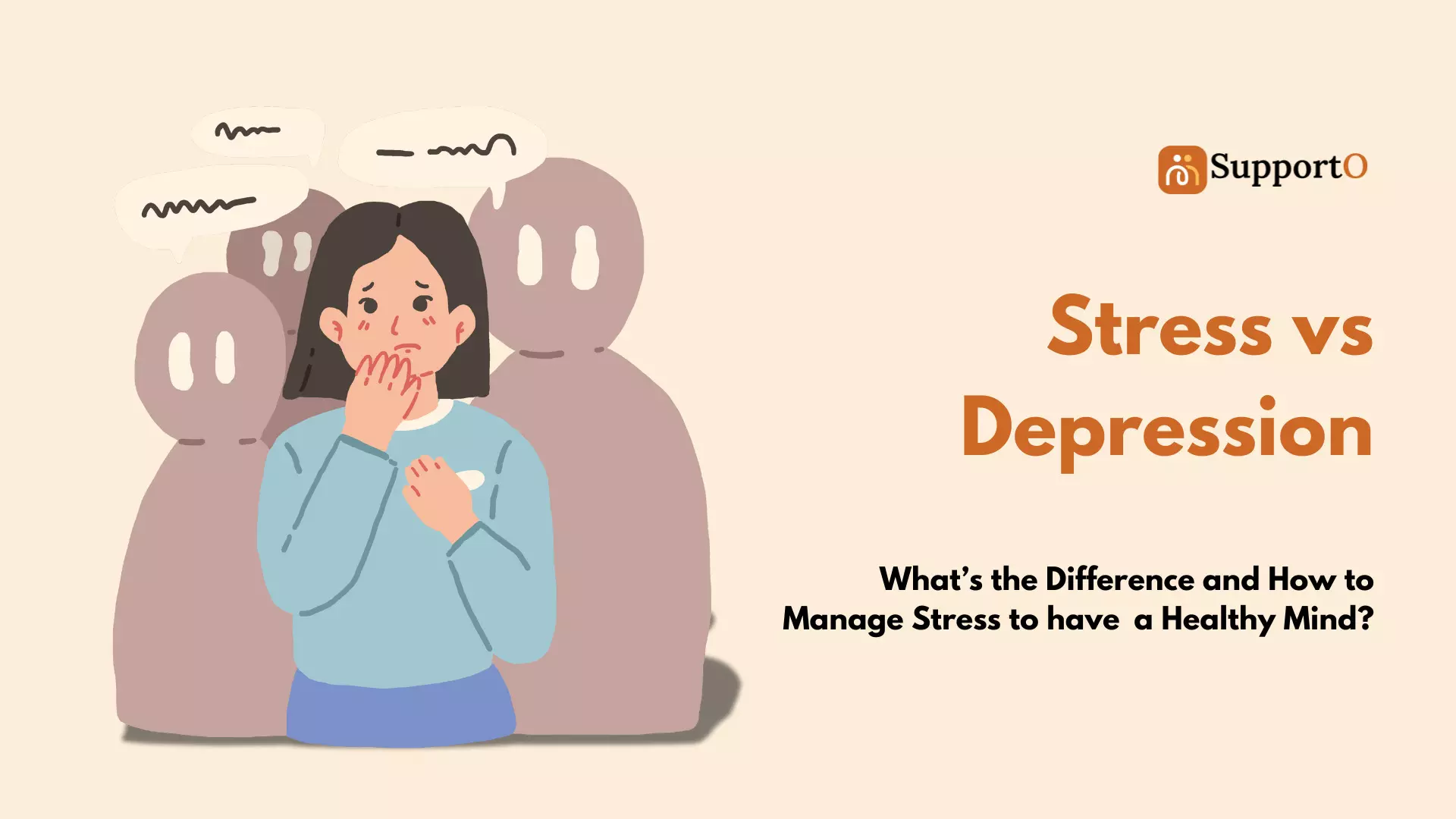Stress vs. Depression: What’s the Difference and How to manage it
The digital era is fast and furious, and as we often complain about entering a gloomy world of information overload, separating stress and depression has become vital. A lot of people think they’re depressed when all they are is stressed. The two conditions can affect mental well-being but require different coping mechanisms. In this blog, let's understand the difference between Stress vs. depression, their Symptoms, and how to Manage Stress to have a Healthy Mind.
Stressed vs. Depressed: What’s the Difference?
What is Stress?
STRESS is a natural reaction to challenges or demands. It can be brought on by work pressures, personal responsibilities or a deluge of digital-age information. Stress is usually temporary but can be coped with designed with true coping strategies.
What is Depression?
Depression, however, is a mental health disorder that affects someone’s emotions, thoughts, and functioning in day-to-day life. In most cases, it is persistent and needs professional intervention. Depression, unlike stress, does not always stem from an identifiable source and can persist for weeks or months.
Symptoms of Stress vs Depression
Symptoms of Stress:
a) Stuck on a lab assignment or feeling anxious
b) Difficulty concentrating
c) Irritability and frustration
d) Physical symptoms such as headaches, muscle tension and fatigue
e) Trouble sleeping (either falling or staying asleep)
f) Digestive issues
Symptoms of Depression:
a) Ongoing sadness or hopelessness
b) Loss of Interest in Activities Once Enjoyed
c) Fatigue and low energy
d) Loss of appetite and/or weight gain/loss
e) Difficulty sleeping (either insomnia or oversleeping)
f) A sense of worthlessness or guilt
g) Self-harm or suicidal thoughts or actions
How the Digital Era Contributes to Mental Health Issues
Due to the fast-food pace of digital content, individuals face too much data, which results in:
a) Constant Exposure to Bad News: Your news feed, social feeds, and emails are choking the senses.
b) Comparison Culture: Social media leads to unrealistic expectations, so we feel greater stress and self-doubt.
c) Work-Life Imbalance: It’s Harder than Ever to Disconnect
Best Practices for Dealing With Stress
1. Identify Stress Triggers
Identifying the sources of stress can lead to better management. Try to journal about or review what induces anxiety through the day and see if you can fix those situations.
2.Engage in Mindfulness and Meditation
Techniques such as mindfulness, meditation, and yoga are great for reducing stress. There are some techniques which help to remain present, to decrease anxiety, and to be clear in mind.
3.Exercise Regularly
Exercise releases endorphins, which are natural stress busters. A simple walk, yoga, or workout can do wonders for mental health. Exercise is an important part of a healthy lifestyle that can help you feel better, look better, and live longer.
4.Limit Digital Consumption
For example, establishing controls for social media usage, taking a break from technology (digital detox) and so on would all be ways to reduce stress. Limiting digital consumption can help you maintain a healthy balance and improve your mental health.
5. Seek Emotional Support
It is important to have a support system. Talking to friends, family, or professionals via emotional platform support networks like SupportO can help provide needed emotional support.
6.Maintain a Healthy Lifestyle
a) Eat a balanced diet
b) Get adequate sleep
c) Stay hydrated
d) Limit caffeine and alcohol consumption
7. Engage in Relaxing Activities
Reduces stress levels: Reading, painting, music, and spending time in nature can help. Engaging in relaxing activities is important because it helps to reduce stress, improve mood, lower heart rate, and promote overall well-being by actively counteracting the effects of daily stressors,
When to Get Professional Help
If stress continues for weeks (or even months), or if depressive symptoms remain for longer than two weeks, please talk to a professional. Therapy, counseling and support platforms like SupportO provide personalized guidance for coping with mental health challenges.
Conclusion
The importance of stress is very different from depression. Stress is a short-term reaction to challenges, while depression is an underlying mental health issue that needs to be addressed by professionals.
Nevertheless, through mindfulness, a balanced lifestyle, and emotional support, stress can be managed and won't progress into depression. Many people are struggling, and if you feel overwhelmed, feel free to take a helping hand from us, SupportO. Take care of your mental health, it’s every bit as important as physical health.
